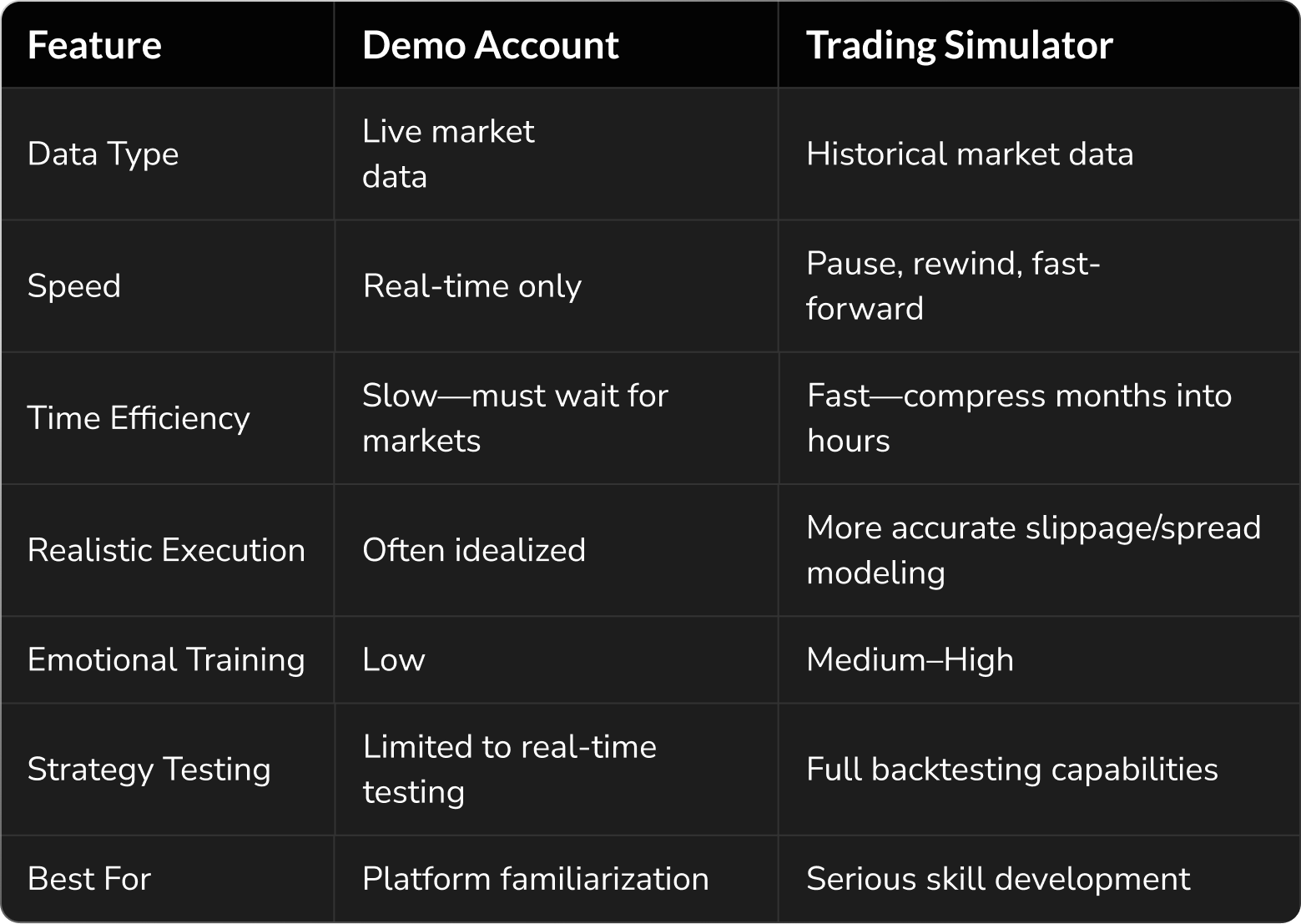Trading Simulators vs Demo Accounts: What’s Better?
.png)
When you're trying to sharpen your trading skills without risking real money, you’ll likely turn to demo accounts or trading simulators. On the surface, they sound similar—both let you practice—but the difference in experience, speed, and growth can be massive.
If you're serious about getting consistent and want to compress years of learning into months, knowing the right tool for your goals isn’t optional—it's essential.
Let’s break it down.
What Is a Demo Account?
A demo account is a practice account offered by brokers that mimics a real trading environment using virtual money. You place trades using real-time market data, just like in a live account—but without financial risk.
Key Features of Demo Accounts
- Real-time price feeds
- Same interface as your live account
- Risk-free environment using fake money
- Offered by most brokers for free
- Easy onboarding with no verification required
- Ability to test multiple asset classes (Forex, Stocks, Crypto, etc.)
Who They're Best For
- Beginners just getting comfortable with a trading platform
- Traders testing basic functionality of a broker’s tools
- Anyone wanting to explore order types, execution, or interface features
Limitations
- Markets only move in real time—you can’t fast-forward.
- No access to past data for backtesting.
- Execution may differ from live trading (e.g., no slippage).
- Emotions aren’t triggered the same way—so you don’t train psychology.
- Limited feedback and no journaling or performance review tools
What Is a Trading Simulator?
A trading simulator is a specialized tool that lets you replay historical market data and simulate trades at any point in time. You control the speed—pause, rewind, fast-forward—letting you compress months or years of trading into hours.
Unlike demo accounts, trading simulators are built to train execution, psychology, and pattern recognition. You're not just watching—you're performing.
Key Features of Trading Simulators
- Access to historical data across multiple timeframes
- Time control: fast-forward, rewind, pause
- Journal and performance tracking
- Simulated emotional pressure from trade outcomes
- Realistic execution modeling in some tools
- Integrated analytics to track win rate, risk-reward ratio, expectancy, etc.
- Ability to isolate specific trading conditions (e.g., high volatility periods, news events)
Who They're Best For
- Traders refining strategies through structured backtesting
- Anyone serious about improving execution and decision-making
- Traders who want to practice specific market conditions
- Intermediate to advanced traders looking to fine-tune an edge
Limitations
- Doesn’t use live market feeds
- Some tools may lack depth in order book simulation
- Requires more deliberate effort than demo accounts
- Usually requires a paid subscription
Demo Accounts vs Trading Simulators: Side-by-Side Comparison

Real-Time vs Historical Simulation: Why It Matters
Time is the one thing you can’t get back. Demo accounts force you to wait. If you’re testing a swing strategy, you might need weeks just to see 2-3 setups. That’s wasted time you could be using to iterate and improve.
Trading simulators change the game. You can:
- Rewind a session to analyze your decisions
- Fast-forward to your entry point
- Rapidly build data on your strategy's performance
- Get 100s of reps in without waiting on the market
In short: demo accounts let you experience the market; simulators let you train in it.
Strategy Development: Depth vs Exposure
Demo accounts give you exposure. You see how markets move in real time. That’s helpful for beginners.
But for strategy development? You need depth.
- What happens if you change the stop-loss size?
- Does your edge hold up during high volatility?
- What happens over 100 trades?
Only simulators let you answer those questions quickly and with data. You’re not guessing—you’re tracking performance.
Tools like FX Replay take this even further with features like:
- Integrated journaling
- Instant trade feedback
- Realistic spreads and slippage modeling
- Performance stats that matter
Emotional Conditioning: The Overlooked Factor
Most traders fail not because they don’t know what to do, but because they can’t do it under pressure.
Demo accounts don’t train your brain to handle wins, losses, or drawdowns. They’re too safe.
Simulators replicate the tension of trading without real money but with real consequences:
- You’re reviewing losses
- You’re tracking stats
- You’re adjusting based on outcomes
That creates accountability—and that’s what builds skill.
When to Use Each Tool
Use a Demo Account If:
- You’re brand new to trading
- You’re exploring a new broker
- You want to learn how to place and manage orders
- You’re not ready to invest in a simulator yet
Use a Trading Simulator If:
- You want to refine a strategy fast
- You want to build confidence through repetition
- You want feedback and performance metrics
- You’re ready to train like a professional
Final Verdict: Simulators for Growth, Demos for Basics
Demo accounts are a great first step.
But if you're trying to get consistent, test strategies, and train like a pro, a trading simulator is the only real option.
Don’t just “watch” the market. Train in it.
Start training with FX Replay now – the #1 trading simulator for realistic backtesting, journaling, and AI mentorship.
In many ways, yes. Simulators often include features like spread/slippage modeling and journaling tools that mirror live trading conditions more accurately than demo environments.
Only in real time. If your setup doesn’t appear for a week, you wait. There’s no way to rewind or simulate past trades like you can in a trading simulator.
Absolutely—especially if you want to improve fast. While demo accounts help you learn the basics, simulators help you develop skill through repetition and focused review.
Yes, most high-quality trading simulators (like FX Replay) are paid tools. But the time you save and the skills you develop can easily be worth the investment.





















